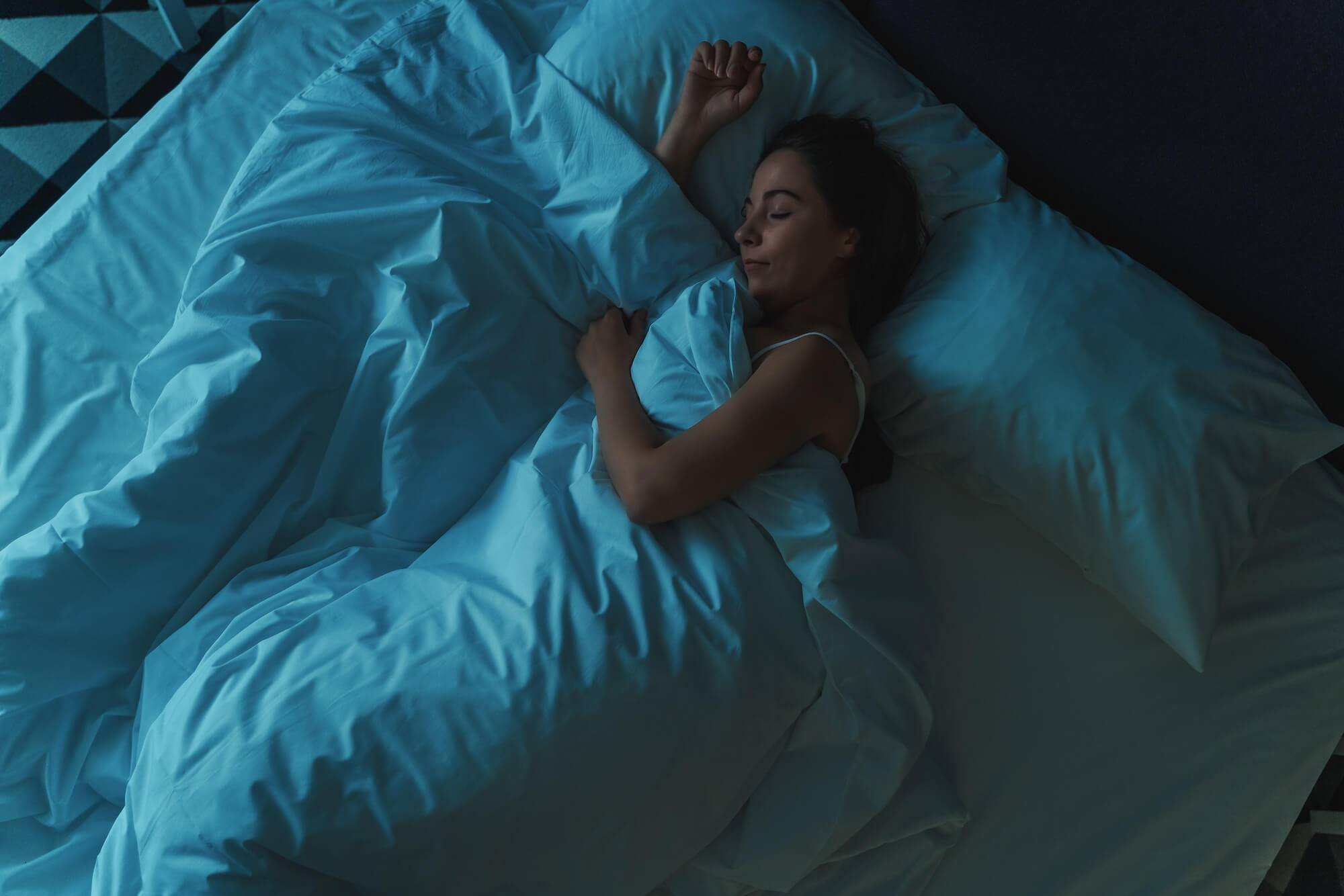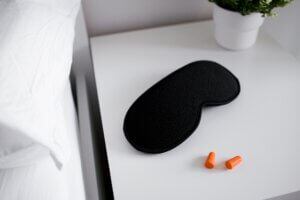Good Sleep Hygiene Tips: Simple Habits for Better Rest

Longer days mean more light and more reasons to play outside and stay up late. However, as the seasons shift from winter’s short, cozy days to the many invitations of spring, it’s important to maintain proper sleep hygiene and establish healthy habits for better rest. Here are a few sleep hygiene tips that help you get into a good bedtime groove.
Create a Consistent Sleep Schedule
Your body’s internal clock, otherwise known as your circadian rhythm, relies on consistency. Just like you don’t bend the hands on your watch to better suit the day’s schedule, avoiding big disruptions to your circadian rhythm helps your body fall asleep and wake up at similar times each day, maximizing the amount of rest you get while you’re asleep. Consistent sleep helps your body maintain:
- Optimum cognitive function
- Increased productivity
- Better mental health
- Reduced risk of accidents
- Physical health and wellness
Establishing an attainable and consistent sleep schedule is the best way to ensure your body gets the rest it needs, seven days a week.
That’s right. Maintaining a consistent sleep schedule, even on the weekends, is paramount to proper sleep hygiene. While there’s some wiggle room to stay up a little later or sleep in, trying to stick to relatively similar sleep and wake times every day aids your mental and physical health.
Optimize Your Sleep Environment
 So, how do you do it? Well, there are a few important sleep hygiene tips you can use to establish a sleep schedule that works for your body and your lifestyle.
So, how do you do it? Well, there are a few important sleep hygiene tips you can use to establish a sleep schedule that works for your body and your lifestyle.
- Make sure your bedroom is at an ideal temperature for sleeping – typically 60 – 67°F or 15 – 20°C. Your body’s temperature naturally drops when you fall asleep, so a moderately cool room is key to maximizing your zzzz’s. If your bedroom, mattress, comforter or blankets make your sleeping environment too hot or too cold, your body will most likely respond by waking up.
- Manage light and light leaks into your bedroom. Using blackout curtains and minimizing electronics and screen time within a bedroom contributes to a restful night.
- Block out disruptive noises. Busy streets, garbage trucks, loud neighbors and restless kiddos can all contribute to sleep disruption. Consider a white noise machine, sleep music playlist or even earplugs to help drown out sounds that would otherwise wake you.
Develop a Relaxing Bedtime Routine
As the evening winds down, it can be helpful to get into a routine that lets your body know it’s time for sleep. Activities to signal sleep time can include:
- Dimming lights in your house
- Taking a warm bath or sauna
- Meditation
- Gentle yoga
- Journaling
- Stretching
- Reading
- Breathing techniques that calm your mind
- Putting on a soothing playlist or music station
 Perhaps most importantly, make sure to limit your screen time for at least two hours before you crawl under the sheets. This allows your mind and body time to wind down without becoming overstimulated. It can also help reduce stress and let your brain transition to a more relaxed frame of mind more easily, letting you drift off without hesitation or anxiousness.
Perhaps most importantly, make sure to limit your screen time for at least two hours before you crawl under the sheets. This allows your mind and body time to wind down without becoming overstimulated. It can also help reduce stress and let your brain transition to a more relaxed frame of mind more easily, letting you drift off without hesitation or anxiousness.
Relaxing your mind and body before bed is another promising way to help ensure a restful night. Take a few moments to gently stretch your muscles before bed, or turn to your favorite book or meditative practice. Doing so helps you transition from the kinetic energy of the day to a more peaceful night.
Be Mindful of Food and Drink
While eating a wholesome, well-balanced diet can significantly impact healthy sleep, you need to make sure to time your meals and choose your foods wisely. For example, avoid spicy or overly acidic foods right before bed as they can contribute to acid reflux and heartburn. Foods high in fat, some dairy products, fatty meats and fried foods are tough on the system all the time, but particularly in the evenings when your body should be expending less energy on digestion.
Caffeine is a morning favorite among many, but even the most devout coffee lovers should avoid the stimulant at least six to eight hours before bedtime. This allows ample time to let the effects of caffeine wear off before bed. Same goes for alcohol, which can inhibit sleep. This might seem counterintuitive given some alcohol’s initial drowsiness effects. However, as your body metabolizes the sugars in alcohol, it can disturb sleep patterns.
Drinking plenty of water throughout the day is essential to overall health and wellness, but too much right before bed can result in waking up in the middle of the night to use the bathroom. Instead, try tapering your liquid consumption before bed, then drink a small glass (four to six ounces) right before sleep. You can also opt for hydrating foods, such as fruits and veggies with high water content.
Tell us what you’d like to see more of!
Physical Activity and Sleep
Winding down in the evenings is important to your sleep patterns, but so is staying plenty active during the day. Regular exercise improves sleep quality in a variety of ways.
- Exercise both invigorates and fatigues your body, allowing it to establish a healthy sleep-wake cycle.
- Exercise increases melatonin production, which in turn helps you fall asleep faster.
- Exercise reduces stress and anxiety.
How and when you exercise is also an important consideration. Demanding physical activity right before bed can be disruptive to sleep hygiene, however, resistance exercise, yoga or light stretching can help you fall asleep. It’s best to talk with your healthcare provider about the best way to structure your exercise routine as it relates to sleep. Generally speaking, shoot for highly aerobic exercise earlier in the day, late afternoon, or early evening, wrapping up at least one to two hours before bed. Then opt for calming, gentle movements such as easy yoga or stretching poses shortly before sleep for better rest.
Manage Stress and Racing Thoughts
 If only it was as easy as laying down on the pillow and falling right to sleep, we’d all be in better health. But the reality is, even for those of us striving for consistent sleep schedules, stress, anxiety and a racing mind can throw things off course. If you find it hard to calm your mind before bed, try these techniques:
If only it was as easy as laying down on the pillow and falling right to sleep, we’d all be in better health. But the reality is, even for those of us striving for consistent sleep schedules, stress, anxiety and a racing mind can throw things off course. If you find it hard to calm your mind before bed, try these techniques:
- Journaling
- Simple breathing techniques
- Reading (although you should avoid content that might trigger stress reactions)
- Meditation
If you find sleep elusive after trying to stick with a consistent sleep schedule and healthy sleep habits, it might be time to talk with a doctor or sleep specialist. Seek help if:
- You wake frequently throughout the night
- You constantly feel tired during the day
- You can’t concentrate or pay attention
- You notice frequent and unexplained changes in your mood or appetite
- You fall asleep while driving or working
The last symptom in particular can be a potentially dangerous one. If you’re worried you’re not getting the rest you need to function properly throughout the day and stay on task, talk with a medical professional about options.
Conclusion
A good night’s sleep can make a huge difference in optimizing your health and wellness. Establishing a consistent and attainable sleep schedule is a great place to start your journey. Make it enjoyable by choosing pre-sleep activities that welcome peace and calm. Allowing your body and mind the time required to rest and rejuvenate is an important aspect of making the most of every day, in every way.



